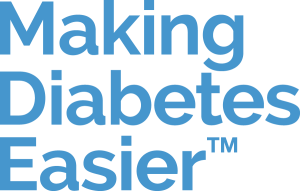Revolutionising diabetes management: Integrating artificial intelligence and big data analytics

Revolutionising diabetes management: Integrating artificial intelligence and big data analytics
Artificial intelligence, or AI for short, is defined as the ability of a computer algorithm to perform tasks in a way that emulates human intelligence.1
In recent years, we’ve seen AI transform various industries, from banking and air travel to healthcare technology. Health monitoring tools offered by smartphones and smartwatches as well as chatbots such as ChatGPT have also taken the world by storm.1
But how can we harness AI’s power to improve health outcomes for people with type 1 diabetes? In this article, we try to answer this question and explore the roles that AI technologies and 'big data' can play in predicting, preventing and managing type 1 and type 2 diabetes.
AI and big data analytics
Before we look into how AI can help predict and manage diabetes, we need to understand how much data there is out there.1
The term ‘big data’ describes the masses of information we currently have access to in our highly digitised world and can analyse with the help of computer software and algorithms.
Big data related to diabetes comes mainly from the following sources:1-3
- Electronic healthcare records
- Patient-reported data (for example, information about symptoms that people can provide by filling out questionnaires)
- Lab results
- Home-recorded data (such as blood glucose levels, blood pressure, weight, diet and physical activity)
- Continuous glucose monitoring (CGM) data or data from other wearable sensors
- Data from home diagnostic and screening tools (such as smart testing tools or home blood and urine testing tools)
- Genomic data
Analysing these data can help experts gain valuable insights into diabetes trends.1 Additionally, information from AI-powered devices can help people with diabetes better understand and manage their condition.1,2
How AI may help predict diabetes

How AI may help predict diabetes
AI can be used to predict various aspects of diabetes, from a person’s risk of developing type 1 or type 2 diabetes to the risk of developing complications or episodes of high or low blood glucose.1 But how?
Using genes to predict risk
Machine learning, which is a branch of AI, can be used to quickly analyse genetic data from large sets of populations and create risk prediction models using statistical analysis.1,4
Type 1 diabetes and some forms of type 2 diabetes have a strong genetic component.2,4 So, AI can predict the risk of developing type 1 diabetes, a specific subtype of type 2 diabetes, or a person’s risk of developing complications.2,4
AI detecting insulin resistance
Some studies have shown that genetic data can also be used to predict if a person will develop insulin resistance or, even further down the line, type 2 diabetes.5,6
Other studies have developed AI models that predict a person’s risk of insulin resistance based on factors such as blood glucose levels, metabolism, kidney and liver function, environmental factors, cholesterol or triglyceride levels, weight or blood pressure.6
Implementing AI in diabetes management devices

Implementing AI in diabetes management devices
Implementing AI in glucose-monitoring and insulin-delivery systems improves precision, increases time in range for people with type 1 diabetes and may even help prevent hypoglycaemia events (hypos).1
Using AI to analyse data about food and physical activity can lead to changes in behaviours, helping people make healthier lifestyle choices. For example, certain smartphone apps use food image recognition to detect the macronutrients in your meal based on a photograph.1 More in-depth knowledge about their nutrition and physical activity may help people with type 1 or type 2 diabetes better manage their condition.1
CGM and closed-loop technology
Wearable sensors that monitor glucose levels (as part of CGM) can offer real-time insights into a person’s blood glucose trajectory and future trends.1,3
When paired with an insulin pump, these powerful algorithms create a fully automated closed-loop insulin delivery system.1 Some closed-loop systems are highly sophisticated and allow for fully automated, continuous insulin infusion, where the amounts of insulin are automatically calculated depending on the user’s needs.1 This level of sophistication has earned them the title of ‘artificial pancreas’.1
Predicting hypos and hypers
Some AI models can analyse and predict when a person is at risk of developing a hypo or a hyper based on their past CGM readings and the trends in their blood glucose levels.1,3
These models are trained on, or ‘learn’ from, a wealth of data associated with hypos or hypers, in addition to the blood glucose readings.1,7 Such data include electronic health records, electrocardiogram (ECG) readings (the heart’s electrical activity), heart rate readings, temperature and even galvanic skin response.1,7
Other AI models have also used carbs intake, breath samples, insulin doses and brain activity.7
How AI can help manage insulin doses
When AI is integrated with a CGM and an insulin pump as part of a closed-loop system, it not only detects the risk of a hypo but may also prevent it, easing some of the worries brought on by living with type 1 diabetes.1
AI-powered insulin dosing and delivery can also help people with type 2 diabetes.1 Research has shown that AI helps healthcare professionals create better insulin recommendations for people with this condition.1
Furthermore, new approaches in personalised medicine suggest that genetic data can be used to help suggest the best drug for someone with type 2 diabetes.1,4
AI and big data hold tremendous potential in treating and preventing both type 1 and type 2 diabetes. However, challenges remain. We need to ensure that AI is used ethically and that the data it uses are inclusive and stored safely.1 AI is not yet being used to its full potential in healthcare systems, but the future looks promising.
Sources
- Mackenzie SC, Sainsbury CAR, Wake DJ. Diabetes and artificial intelligence beyond the closed loop: a review of the landscape, promise and challenges. Diabetologia. 2024;67(2):223–35. https://doi.org/10.1007/s00125-023-06038-8
- Teixeira PF, Battelino T, Carlsson A, et al. Assisting the implementation of screening for type 1 diabetes by using artificial intelligence on publicly available data. Diabetologia. 2024;67:985–94. https://doi.org/10.1007/s00125-024-06089-5
- Contreras I, Vehi J. Artificial intelligence for diabetes management and decision support: Literature review. J Med Internet Res. 2018;20(5):e10775. https://doi.org/10.2196/10775
- Oikonomakos IT, Anjana RM, Mohan V, et al. Recent advances in artificial intelligence-assisted endocrinology and diabetes. Explor Endocr Metab Dis. 2024;1:16–26. https://doi.org/10.37349/emed.2023.00004
- González-Martín JM, Torres-Mata LB, Cazorla-Rivero S, et al. An artificial intelligence prediction model of insulin sensitivity, insulin resistance, and diabetes using genes obtained through differential expression. Genes. 2023;14(12):2119. https://doi.org/10.3390/genes14122119
- Afsaneh E, Sharifdini A, Ghazzaghi H, et al. Recent applications of machine learning and deep learning models in the prediction, diagnosis, and management of diabetes: A comprehensive review. Diabetol Metab Syndr. 2022;14:196. https://doi.org/10.1186/s13098-022-00969-9
- Mujahid O, Contreras I, Vehi J. Machine learning techniques for hypoglycemia prediction: Trends and challenges. Sensors. 2021;21(2):546. https://doi.org/10.3390/s21020546


